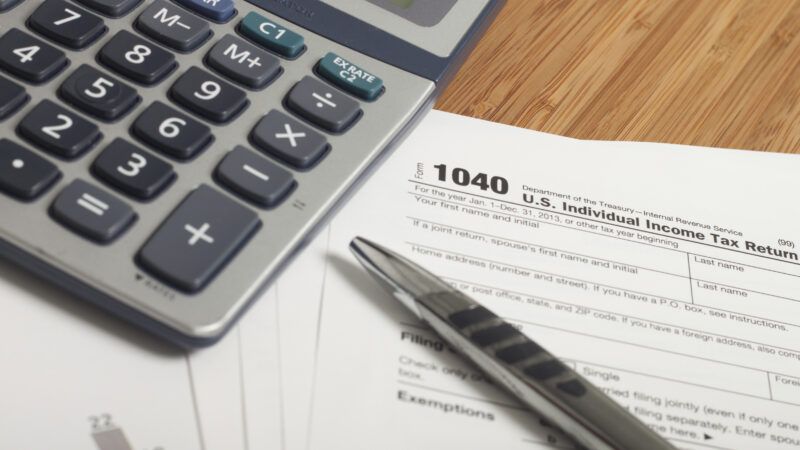These Reforms Would Simplify Our Messy Tax Code—and Level the Playing Field
The government currently collects revenue in an arbitrary and distortionary manner, with loopholes that benefit special groups.

Republicans claim they are slashing government, but they're about to explode the budget deficit to extend President Donald Trump's tax cuts—which would balloon interest payments on the national debt, already one of the largest expenses in the federal budget. That's no way to slash the size of government.
They could offset the lost revenue from tax cuts by reducing spending and entitlements, but that would require hard political choices. Instead, Senate Republicans are attempting to resort to budget gimmicks. Pretending the 2017 tax cuts were always going to be extended makes it look like the current proposal has no cost.
That's pure political cowardice. There is an alternative to this mess.
The U.S. tax code is broken. That's mainly because it collects revenue in an arbitrary, distortionary, and unfair manner. At the heart of the problem are "tax expenditures": credits, deductions, and loopholes that benefit the government's favorite groups and behaviors.
These provisions make the tax code more complicated, less neutral, and less growth oriented than it ought to be. Worse, they shift the burden onto the unfavored groups, requiring higher rates to make up for revenue lost to carveouts.
This isn't just a matter of accounting or administrative complexity; it's a matter of morals. As the late economist David Bradford observed, our tax code reflects no coherent philosophy.
It's a patchwork of exceptions and preferences designed more by lobbyists than by public servants. Policymakers claim they are encouraging savings, promoting fairness, or aiding the poor. In reality, many tax expenditures—also known as tax breaks—serve no purpose beyond enriching powerful interest groups.
The solution is to return to first principles. We must begin by defining the tax base in a principled way. What should count as income? What should be taxed, and when? Only then can we properly distinguish between legitimate exemptions and unjustifiable giveaways.
Most tax expenditures exist because our tax base is treated like a hybrid mess. Officially, the U.S. runs an income tax. But it includes some consumption tax elements, such as tax-deferred retirement accounts and exclusions for unrealized capital gains, to minimize the penalty to saving and investment imposed by the use of an income tax base.
My preferred path is to adopt a flat consumption tax, like the one proposed by Robert Hall and Alvin Rabushka. Under this system, income is taxed only once—at the point when it's spent—and saving is not penalized. There are no deductions for mortgage interest, no special credits for electric vehicles, and no carveouts for employer-provided insurance.
The only major remaining tax expenditure would be a generous personal allowance to exempt essential consumption—because everyone needs to buy the basics of life, and this carveout protects those with the least income from paying a wildly disproportionate tax. The result is a simple, transparent tax system with broad fairness and powerful pro-growth incentives. Retain what's justified. Eliminate the rest.
Short of that, we can still make immediate progress by fixing flaws in the current system. This calls for evaluating each expenditure based on clear principles: Does a provision prevent or enable double taxation? Does it ensure tax neutrality? Or does it reward politically connected industries?
Some provisions should be retained, including lower tax rates on capital gains and dividends, and exclusions for life insurance payouts funded with after-tax income. These are not handouts; they correct distortions created by the income tax itself.
Most other tax expenditures fail this test. The mortgage interest deduction benefits the wealthy while inflating housing prices. The charitable deduction, though noble in purpose, favors wealthy donors and introduces needless complexity. Energy tax credits, corporate loopholes, and state and local tax deductions distort investment and transfer wealth upward rather than outward.
These should be repealed or replaced with something better. For instance, rather than specifically subsidizing corporate research and development through tax credits, we should allow full expensing of all capital investments. This would encourage innovation across the economy without picking winners and leaving others behind.
To illustrate all of this, my colleague Jack Salmon and I produced a website that categorizes America's 170-plus tax expenditures. There are those we would keep, those we would eliminate, and those that may be too politically hard to eliminate, for which we offer reform ideas.
You'd be stunned by how much revenue can be found to offset Trump's tax cuts and other popular spending programs. For instance, as the Cato Institute's Adam Michel has noted, ending just two Inflation Reduction Act tax breaks—the production tax credit and the investment tax credit, both given to special interests with low return on investment—could pay for all of the best tax cuts.
Reforming the tax code won't be easy. Every deduction has a constituency and every loophole a defender. But the benefits are enormous: lower tax rates overall, greater economic growth, and a more principled, transparent system. Better yet, it could help level the playing field between workers and investors, large corporations and small businesses, and renters and homeowners.
In the end, the tax code should reflect the values of a free society. We deserve equal treatment under the law, minimal distortion of our choices, and taxation that is clear, comprehensible, and just.
COPYRIGHT 2025 CREATORS.COM


Show Comments (62)